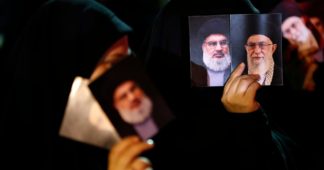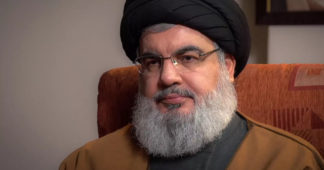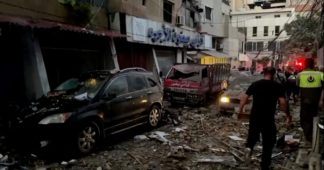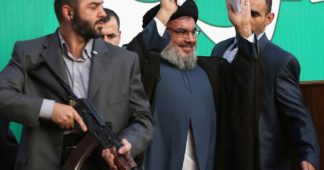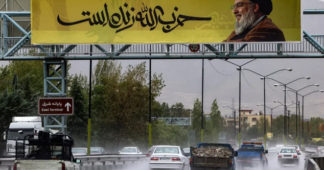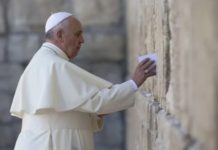People seeking refuge on the streets of downtown Beirut openly mourn the death of Hezbollah’s leader
By Nader Durgham in Beirut
Sep 28, 2024
An atmosphere of shock and grief swept through Martyrs’ Square in central Beirut on Saturday, as those who fled Israel’s relentless bombing of the southern suburbs, known as Dahiyeh, learned of Hezbollah leader Hassan Nasrallah’s death.
As the news spread, a man screamed at the top of his lungs and stomped the ground on Martyrs’ Square. Just a few metres away, a woman wailed and cried in front of the Mohammad al-Amin Mosque.
“It was too early, Abu Hadi,” she shouted, using Nasrallah’s nickname, referring to his eldest son, who was also killed by Israel in 1997.
“Can you hear me, oh sayyed [Nasrallah’s title], head of the Muslim community and its honour?”
“Sayyed was not killed. Sayyed will remain with us,” she added.
Hezbollah confirmed the death of its leader in the afternoon, a day after Israel said it had killed him and several other commanders from the Lebanese group in a series of powerful air strikes on Dahiyeh on Friday evening.
The massive attack flattened six residential buildings and was followed by Israeli orders for residents to evacuate areas surrounding Dahiyeh and nearby regions, warning that further strikes were imminent.
“We’ve been through so many wars, but nothing compares to the strike that hit us yesterday,” said Rabia, a woman who initially fled South Lebanon only to find herself displaced once again.
Rabia is among the many people forcibly displaced from Dahiyeh on Friday night, now seeking refuge on the streets of downtown Beirut and along the waterfront. They remain stranded, uncertain of where to go next.
The news of Nasrallah’s death sent shock waves through the entire area around Martyrs’ Square. People already grieving the loss of their homes and loved ones from the previous night’s strikes were overtaken by even deeper sorrow and anger.
Many broke down in tears on the streets as they struggled to comprehend the gravity of the news.
“The news is unbelievable,” said Walid Mohammad, who also escaped Dahiyeh. “Our hearts are burning. There is a lump in our hearts.”
“I hope it’s a joke, fake news, because this man cannot be replaced,” he added. “No way. May God avenge his death.”
‘Where are they now?’
Some supporters have begun questioning Hezbollah’s decision to clash with Israel on 8 October of last year, a move made in support of Hamas in Gaza.
“Why did he enter this war?” said Rabia. “Did we alleviate anything from Gaza? We did not. And now, the sayyed is gone. Who will replace him now?”
“No one can take his place; not a single person can take his place.”
Rabia also criticised the Iran-led “axis of resistance”, saying that while Yemen’s Houthis backed Hezbollah, Syria and Iran did not.
“When Hezbollah got involved, nobody supported it,” she said. “When we said we were entering a war with Israel, they [the groups in the axis of resistance] said they would support us, but no one supported us. Where are they?”
Nasrallah’s death comes as the Lebanese health ministry announced that at least 1,640 people have been killed in Israel’s attacks on Lebanon since 8 October. This figure includes 1,030 people who have been killed since 16 September.
The ministry added that many people remain trapped under the rubble, with bodies still being recovered.
Since the announcement of Nasrallah’s death, Israel has continued bombing Dahiyeh and other parts of Lebanon, including the south.
We remind our readers that publication of articles on our site does not mean that we agree with what is written. Our policy is to publish anything which we consider of interest, so as to assist our readers in forming their opinions. Sometimes we even publish articles with which we totally disagree, since we believe it is important for our readers to be informed on as wide a spectrum of views as possible.
